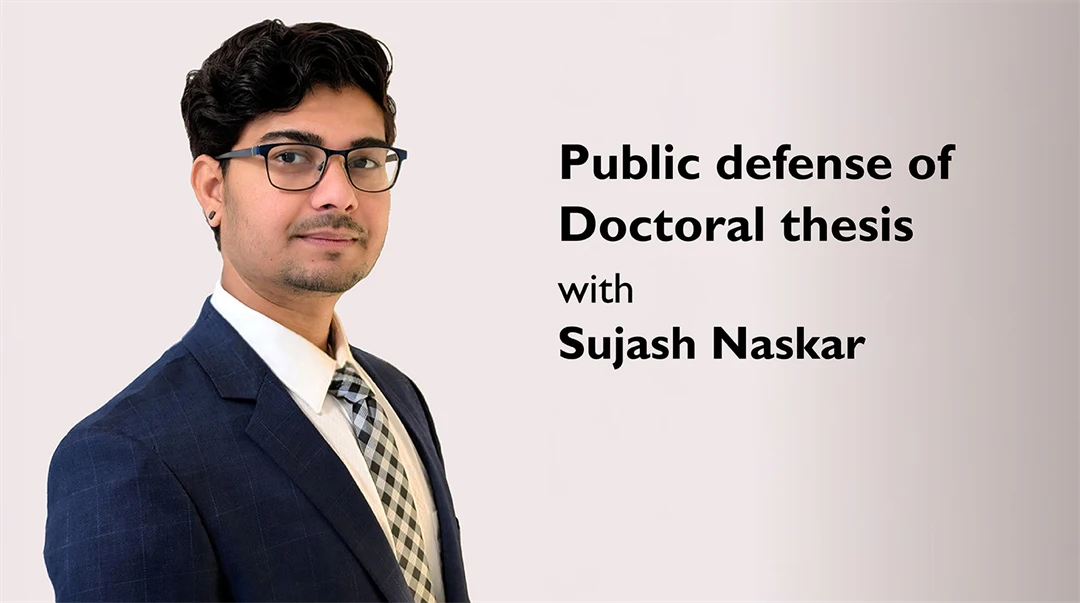Defence of Doctoral Thesis with Sujash Naskar
Welcome to a public defense of doctoral thesis in Computer Engineering with Sujash Naskar who will present his thesis "Lightweight Cryptographic Solutions for Privacy-Preserved Authentication & Communication in Vehicular Ad-Hoc Networks".
Date: April 29th, 2025
Time: 09:15
Place: Campus Sundsvall, Room M108, M-building, Youtube
and Zoom: https://miun-se.zoom.us/j/69091788123 (Meeting ID: 690 9178 8123)
Doctoral thesis: "Lightweight Cryptographic Solutions for Privacy-Preserved Authentication & Communication in Vehicular Ad-Hoc Networks"
Respondent: Sujash Naskar
Supervisor and Chair: Professor Mikael Gidlund, Mittuniversitetet
Co-supervisor: Prof. Tingting Zhang, Mittuniversitetet and Prof. Gerhard P. Hancke Jr, city University of Hong Kong
Opponent: Professor Chunming Rong, University of Stavanger, Norway
Examining committee:
Professor Andreas Jacobsson, Malmö University
Professor Mats Björkman, Mälardalen University
Professor Lukasz Wisniewski, Technische Hochschule Ostwestfalen-Lippe (THOWL), Germany.
Backup: Associate Prof. Sebastian Bader, Mittuniversitetet
Abstract
As a key component of Intelligent Transportation Systems (ITS), Vehicular Ad hoc Networks (VANETs) enable real-time data exchange, traffic optimization, and smarter mobility. However, large-scale deployment raises critical security and privacy concerns, including message integrity, user anonymity, and protection against unauthorized access. This thesis proposes lightweight cryptographic protocols for secure and privacy-preserving authentication in both centralized and decentralized VANETs. The solutions are designed for real-time efficiency, scalability, and strong security. A primary contribution is the development of a localized task management system that significantly reduces authentication latency in centralized VANETs, achieving vehicle verification within a fraction of a millisecond. In decentralized settings, the proposed protocols employ advanced cryptographic mechanisms to establish distributed trust without incurring high computational overhead, including elliptic curve digital signatures (ECDSA) and non-interactive zero-knowledge proofs (NIZKPs). These techniques provide strong, provable security while preserving user anonymity during authentication and message exchange. To enhance group communication in VANETs, the thesis introduces efficient group key-sharing schemes that support secure, direct interactions among vehicles. Furthermore, a novel localized revocation mechanism immediately removes malicious vehicles from the network, addressing a key limitation in existing frameworks. This ensures fast, secure authentication for time-sensitive message transfers while limiting the propagation of malicious data. The thesis also investigates the proposed protocol’s performance under dynamic conditions such as high traffic density, large-scale decentralized deployments, and remote authentication scenarios. It introduces an innovative batch verification technique that supports fault-tolerant Vehicle-to-Vehicle (V2V) authentication, capable of maintaining high throughput while accurately identifying faulty messages even when the invalid message rate reaches 42%. Empirical evaluations demonstrate that the proposed solutions outperform existing schemes in terms of latency, computational efficiency, and robustness. The protocols complete single vehicle verifications within 5 milliseconds, making them suitable for dense and time-critical VANET environments. Additionally, all proposed methods align with prevailing vehicular communication standards such as IEEE WAVE and 3GPP C-V2X, ensuring practical applicability. In summary, this research advances the state of the art in VANET security by delivering scalable, privacy-preserving, and efficient authentication protocols that meet the demands of real-time vehicular communication systems.
